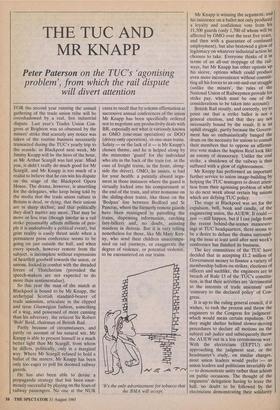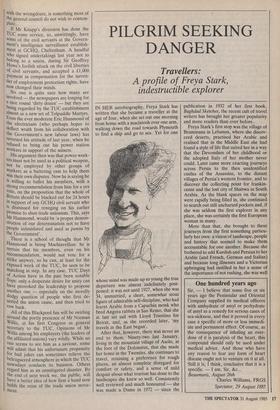THE TUC AND MR KNAPP
Peter Paterson on the TUC's 'agonising
problem', from which the rail dispute will divert attention
FOR the second year running the annual gathering of the trade union tribe will be overshadowed by a real, live industrial dispute. Last year's Trades Union Con- gress at Brighton was so obsessed by the miners' strike that scarcely any notice was taken of the routine business necessarily transacted during the TUC's yearly trip to the seaside: in Blackpool next week, Mr Jimmy Knapp will be the hero of the hour, as Mr Arthur Scargill was last year. Mind you, it didn't really do much good for Mr Scargill, and Mr Knapp is too much of a realist to believe that he can win his dispute on the stage of the Blackpool Opera House. The drama, however, is unsettling for the delegates, who keep being told by the media that the trade union culture in Britain is dead, or dying, that their unions are in sharp decline, and that politically they don't matter any more. That may be more or less true (though insofar as a rail strike presumably affects millions of peo- ple it is undoubtedly a political event), but grim reality is easily thrust aside when a permanent press conference seems to be going on just outside the hall, and when every speech, however remote from the subject, is incomplete without expressions of heartfelt goodwill towards the union, or unions, locked in combat with the dreaded forces of Thatcherism (provided the speech-makers are not expected to do more than sentimentalise).
So this year the man of the match at Blackpool is bound to be Mr Knapp, the archetypal Scottish standard-bearer of trade unionism, articulate in the clipped and terse Glaswegian fashion, something of a wag, and possessed of more cunning than his adversary, the reticent Sir Robert 'Bob' Reid, chairman of British Rail.
Partly because of circumstances, and partly on account of his natural wit, Mr Knapp is able to present himself in a much better light than Mr Scargill, from whom he differs, politically, only in a marginal way. Where Mr Scargill refused to hold a ballot of the miners, Mr Knapp has been only too eager to poll his doomed railway guards.
He has also been able to devise a propaganda strategy that has been enor- mously successful by playing on the fears of railway passengers. No one at the NUR cares to recall that by solemn affirmation at successive annual conferences of the union Mr Knapp has been specifically ordered not to negotiate any productivity deals with BR, especially not what is variously known as OMO (one-man operation) or DOO (driver-only operation), or one-man trains. Safety — or the lack of it — is Mr Knapp's chosen theme, and he is helped along by the misnomer 'guard' for the individual who sits in the back of the train (or, in the case of freight trains, in the front, along- side the driver). OMO, he insists, is bad for your .health: a patently absurd argu- ment in those instances where the guard is virtually locked into his compartment at the end of the train, and utter nonsense on the sliding-door trains, like those on the `Bedpan' line between Bedford and St Pancras, where the formerly remote guards have been reassigned to patrolling the trains, dispensing information, catching fare-bilkers and, no doubt, assisting maidens in distress. But it is very telling nonetheless for those, like Ms Mary Ken- ny, who send their children unaccompa- nied on rail journeys, or exaggerate the degree of violence, or potential violence, to be encountered on our trains.
'It's the only advertisement for tobacco that the BMA will accept.' Mr Knapp is winning the argument, and his insistence on a ballot not only produced a loyalty and confidence vote from his 11,500 guards (only 1,700 of whom will be affected by OMO over the next five years, and then with a guarantee of continued employment), but also bestowed a glow of legitimacy on whatever industrial action he chooses to take. Everyone thinks of it in terms of an all-out stoppage of the rail- ways, but Mr Knapp has other options up his sleeve, options which could produce even more inconvenience without commit- ting all his forces to an out-and-out struggle (unlike the miners', the rules of the National Union of Railwaymen provide for strike pay, which must be one of the considerations to be taken into account).
British Rail stoutly, and correctly, try to point out that a strike ballot is not a general election, and that they are not necessarily bound by the result. It is an uphill struggle, partly because the Govern- ment has so enthusiastically banged the drum on the necessity for unions to consult their members that to oppose an affirma- tive vote makes the hapless Reid look like an enemy of democracy. Unlike the coal strike, a shutdown of the railway is thus suffused with a glow of righteousness.
Mr Knapp has performed an important further service to union image-building by helping the TUC managers to divert atten- tion from their agonising problem of what to do next week about certain big unions which are defying TUC policy.
The stage at Blackpool was set for the expulsion, bell, book and candle, of the engineering union, the AUEW. It could just — still happen, but if I can judge from the recent behind-the-scenes manoeuvr- ings at TUC headquarters, there seems to be a desire to defuse the drama surround- ing the issue at least until after next week's conference has finished its business.
The key committees of the TUC have decided that in accepting £1.2 million of Government money to finance a variety of membership ballots on strikes, elections of officers and suchlike, the engineers are in breach of Rule 13 of the TUC's constitu- tion, in that their activities are 'detrimental to the interests of trade unionism' and `contrary to the declared policy' of Con- gress.
It is up to the ruling general council, if it wishes, to rush the process and throw the engineers to the Congress for judgment: which would mean certain expulsion. Or they might shelter behind slower-moving procedures to declare all motions on the subject sub judice and subsequently throw the AUEW out in a less ceremonious way. With the electricians (EEPTU) also approaching the judgment seat, or the headmaster's study, on similar charges, most union leaders would prefer — as union leaders and politicians invariably do — to demonstrate unity rather than schism on public occasions. The thought of the engineers' delegation having to leave the hall, no doubt to be followed by the electricians demonstrating their solidarity with the wrongdoers, is something most of the general council do not wish to contem- plate.
If Mr Knapp's diversion has done the TUC some service, so, unwittingly, have some of the civil servants at the Govern- ment's intelligence surveillance establish- ment at GCHQ, Cheltenham. A handful who signed undertakings last year not to belong to a union, during Sir Geoffrey Howe's foolish attack on the civil liberties of civil servants, and accepted a £1,000 payment as compensation for the surren- der of employment protection rights, have now changed their minds. No one is quite sure how many are involved — the newspapers are longing for a nice round 'dirty dozen' — but they are being regarded by the TUC establishment almost as a new set of Tolpuddle Martyrs. Even the ever moderate Eric Hammond of the electricians (who perhaps hopes to deflect wrath from his collaboration with the Government's new labour laws) has reversed his attitude of last year, when he refused to bring out his power station workers in support of the miners. His argument then was that power work- ers must not be used as a political weapon, for be employed by other groups of workers as a battering ram to help them Win their own disputes. Now he is saying he is willing to ballot his members, with a strong recommendation from him for a yes vote, on the proposition that the whole of Britain should be blacked out for 24 hours in support of any GCHQ civil servant who is dismissed for reneging on his earlier promise to shun trade unionism. This, says Mr Hammond, would be 'a proper demon- stration of our determination not to have People intimidated and used as pawns by the Government'.
There is a school of thought that Mr Hammond is being Machiavellian: he is certain that his members, even on his recommendation, would not vote for a strike anyway, so he can, at least for the exposed week of the TUC, be seen to be Marching in step. In any case, TUC Days of Action have in the past been notable flops: only a desperate desire for unity can have provoked the leadership to propose another one — especially on the morally dodgy question of people who first de- serted the union cause, and then tried to row back.
All of this Blackpool fun will be swirling around the portly presence of Mr Norman Willis, at his first Congress as general secretary to the TUC. Opinions of Mr Willis among his employers (the leaders of the affiliated unions) vary wildly. While no one seems to see him as a saviour, some will admit that his unfortunate propensity for bad jokes can sometimes relieve the beleaguered atmosphere in which the TUC nowadays conducts its business. Others regard him as an unmitigated disaster. By the end of next week we, the public, will have a better idea of how firm a hand now holds the reins of the trade union move- ment.











































 Previous page
Previous page